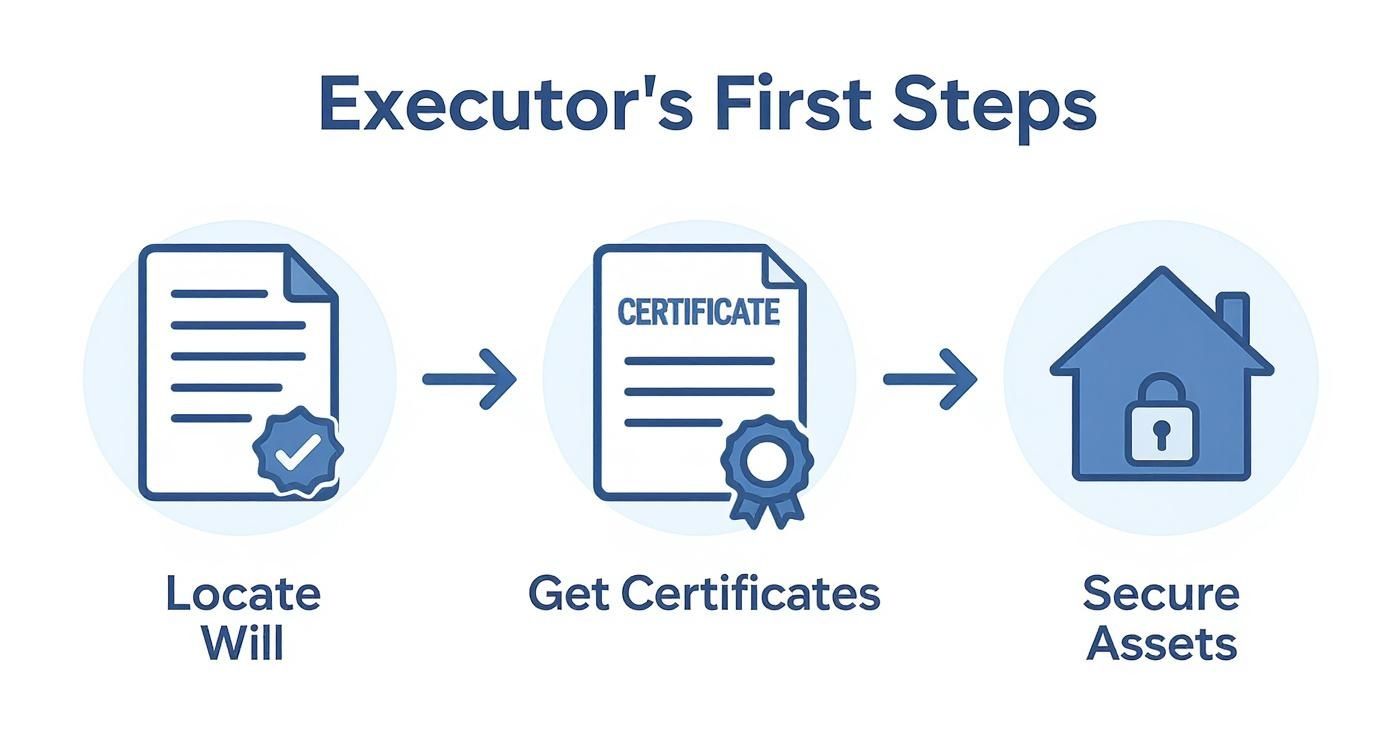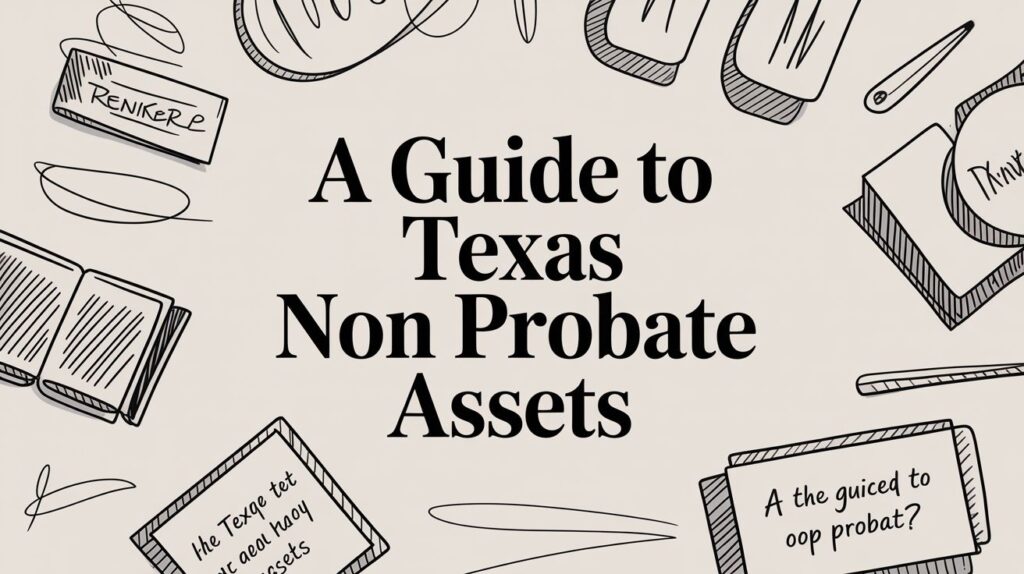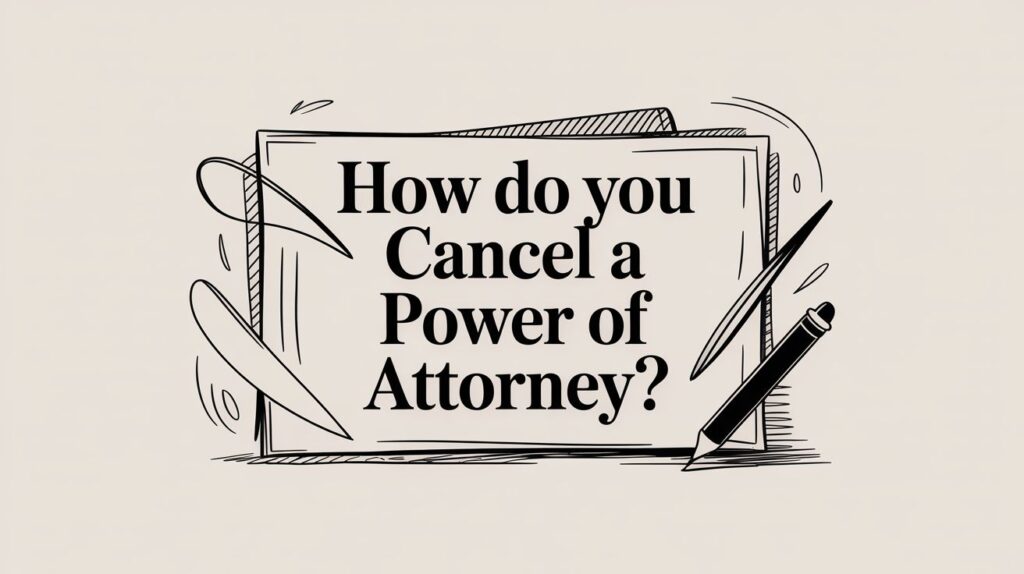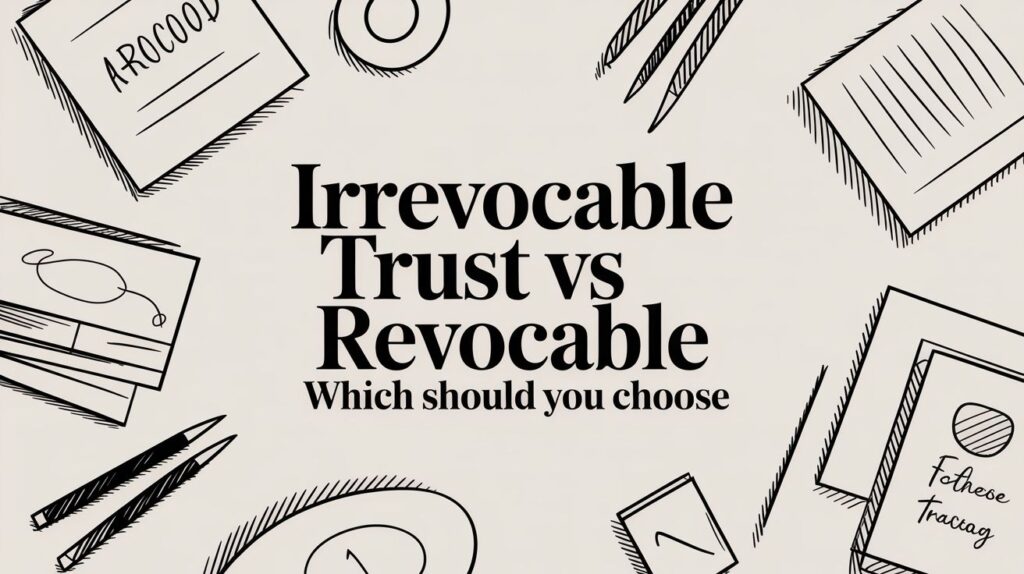When someone names you as the executor of their will, they are placing an immense amount of trust in you. They've chosen you to carry out their final wishes, a role that involves managing their estate, paying their debts, and ensuring their remaining assets reach the right people. It's a significant responsibility, and it often arrives during a time of personal grief, which can feel overwhelming.
This guide provides a compassionate, step-by-step overview of what this role entails under Texas law, offering clarity and reassurance for families navigating this difficult transition.
Your Role as an Executor: A Compassionate Overview

Being asked to serve as an executor is a profound sign of trust. Your loved one chose you because they believed in your integrity and judgment to see their final plans through. But let's be honest—understanding what that actually means can feel overwhelming, especially when you're also navigating a personal loss.
Think of yourself as the captain of a ship. The will is your map, and the Texas Estates Code is your nautical chart. Your mission is to steer the estate through the legal and financial waters of the Texas Probate Process until it reaches its final, intended destination safely.
Your Core Mission
At its heart, your role is to honor the person who has passed by managing their affairs transparently and efficiently. This isn't a single task but a series of phases, each with its own challenges. We'll break them all down in this guide, but your main responsibilities boil down to these four steps:
- Initiating the Probate Process: This starts with filing the will in the proper Texas court to get it legally validated.
- Managing Estate Assets: You'll need to identify, secure, and create a detailed inventory of everything the person owned, from bank accounts and stocks to real estate and personal belongings.
- Settling Debts and Taxes: It’s your job to notify creditors and use the estate's funds to pay all legitimate debts and final taxes.
- Distributing Assets: Once all the bills are paid, you will transfer the remaining property to the beneficiaries, exactly as the will instructs.
This journey demands careful attention to detail and an unwavering commitment to acting in the best interests of the estate and its beneficiaries.
Key Takeaway: The Fiduciary Duty
As an executor, you have what's called a "fiduciary duty." That’s a legal term that means you must act with the highest degree of honesty and loyalty, always putting the estate's interests ahead of your own. This legal obligation is the cornerstone of your entire role and guides every decision you make.
Navigating these duties requires both patience and diligence. You aren't just managing money and property; you are safeguarding a legacy. Our goal here is to give you plain-English explanations and step-by-step guidance to help you fulfill this critical role with confidence and peace of mind.
The First Steps After a Loved One Passes
In the hours and days after losing a loved one, knowing where to begin can feel impossible. As an executor, your first duties are focused on securing the essential documents and assets that form the foundation of the entire estate administration process. Taking these initial steps can provide a sense of direction during a profoundly difficult time.
Your immediate priority is to locate the original will. This document is the legal roadmap you must follow, so finding it is paramount. If you're unsure where it is, common places to check include a safe deposit box, a home safe, or with the attorney who drafted it for your loved one's Wills & Trusts.
Secure Key Documents and Notify Essential Parties
Once you have the will, the next crucial document is the death certificate. You will need multiple certified copies—often 10 or more—as nearly every financial institution, government agency, and insurance company will require one to process claims or close accounts. The funeral home can typically help you order these.
For a complete list of documents you'll need, check out our helpful probate document checklist for executors.
With these documents in hand, you can begin notifying key parties:
- Social Security Administration: To stop benefit payments and inquire about any survivor benefits.
- Banks and Financial Institutions: To protect accounts from unauthorized access.
- Life Insurance Companies: To start the claims process for beneficiaries.
- Credit Card Companies and Lenders: To prevent fraudulent charges and freeze accounts.
As part of this initial process, families sometimes encounter medical procedures to determine the cause of death. Gaining a general sense of what's involved can be helpful, and you can learn more by understanding the role of autopsies in Texas.
Safeguarding the Estate's Property
Your initial duties as an executor also require you to take possession of the deceased’s property to ensure its safekeeping, from real estate to personal valuables. It’s also wise to cancel non-essential subscriptions and memberships to prevent unnecessary drains on estate funds.
These actions are crucial for protecting the estate right from the start.
Key Takeaway: Protect the Property Immediately
Securing tangible assets is not just about locking doors. It's about fulfilling your fiduciary duty to protect the value of the estate for the beneficiaries from the very beginning. This includes changing locks on the home, ensuring vehicles are safely stored, and collecting important items like jewelry or art.
These first steps are practical and protective. By methodically working through this checklist, you create a secure starting point for navigating the more complex duties that lie ahead in the Texas probate process.
Navigating the Texas Probate Process
The word "probate" can sound intimidating, but at its core, it's simply the official legal process that gives you the authority to act as executor. Think of it as a court-supervised validation. It’s how a Texas court formally recognizes the will as legally sound and officially appoints you to manage the estate.
This whole journey kicks off when you or your attorney file an application to probate the will. This is typically done in the county where the deceased lived. As outlined in Title 2 of the Texas Estates Code, this step gets the legal wheels turning. You can expect an initial court hearing, which is usually a pretty straightforward affair where a judge confirms the will is valid and officially names you as the executor.
Receiving Your Official Authority
Once the judge signs off on the application, the court issues a document that is absolutely critical to your role: Letters Testamentary. Don't let the name fool you; this isn't a traditional letter. It's a formal, one-page court order that serves as your official badge of authority.
This document is your key to everything. Financial institutions won't give you access to the deceased’s bank accounts without it. Investment firms will ask for it before transferring securities, and you'll need it to sell real estate or other property. It's the ultimate proof that you have the legal right to act on behalf of the estate.
The infographic below gives you a bird's-eye view of an executor's initial duties, starting from the moment you locate the will all the way to securing the estate's assets under your newfound authority.

As you can see, each step logically builds on the last, leading you to the court-ordered power you need to do your job effectively.
Notifying Creditors: A Legal Requirement
With your Letters Testamentary in hand, one of your very first legal duties is to let potential creditors know about the death. The Texas Estates Code, Section 308.051, requires you to publish a "Notice to Creditors" in a local newspaper.
This isn't just a formality—it’s a critical step that serves a few key purposes:
- It starts the clock. This published notice creates a firm deadline for anyone owed money by the deceased to come forward and make a claim. This prevents old debts from popping up unexpectedly down the road.
- It protects you personally. By following this legal procedure, you're fulfilling your duty to identify and handle legitimate debts, shielding you from personal liability.
- It paints a clear financial picture. You can't possibly know what assets are truly available for beneficiaries until you know exactly what the estate owes.
Properly navigating the Texas Probate Process is the foundation of your role as executor. It provides the legal framework that empowers you to carry out your loved one's final wishes with confidence and legal protection.
Managing Estate Assets and Paying Debts

At the very heart of your role as an executor is a profound legal and ethical obligation known as fiduciary duty. This isn't just legal jargon; it's a promise. It means you must act with complete loyalty, always putting the interests of the estate and its beneficiaries ahead of your own.
This duty is never more critical than when you're managing the estate's finances. Your job is to balance everything the deceased owned against everything they owed. It starts with creating a detailed inventory—not just a list, but a comprehensive accounting that will serve as the foundation for every financial decision you make.
Identifying and Securing Estate Assets
First things first, you have to track down, secure, and inventory every single piece of property the estate owns. This task demands meticulous organization and can easily become one of the most time-consuming parts of the job.
It's a bigger undertaking than most people realize. A 2021 survey found that non-professional executors spend an average of 570 hours settling estate matters. That’s a staggering amount of time, highlighting just how demanding these responsibilities can be.
Your inventory needs to be exhaustive and should include:
- Real Estate: This covers homes, land, or any other properties. We've put together a helpful checklist in our guide on executor duties for Texas real estate.
- Financial Accounts: Think bank accounts, retirement funds, investment portfolios, and life insurance policies.
- Personal Property: Don't forget the tangible items, like vehicles, jewelry, art, and other valuables.
A crucial part of this process involves getting an accurate estate valuation for Inheritance Tax purposes. You can't just guess what things are worth. For significant assets like real estate or valuable collectibles, you'll likely need professional appraisals to determine their fair market value.
Paying Debts and Final Expenses
Once you have a clear picture of the assets, it’s time to turn your attention to the other side of the ledger: the liabilities. The Texas Estates Code is very clear on this. You must use estate funds to pay all legitimate debts, taxes, and final expenses before a single dollar goes to the beneficiaries.
Key Takeaway: Debts are Paid Before Inheritances
Beneficiaries do not inherit assets until all of the estate's debts are settled. Your primary duty is to the estate as a whole, which includes satisfying its financial obligations first. This often requires patience from heirs, and it is your job to manage expectations while following the law.
You'll need to carefully review every claim made against the estate. This includes everything from mortgages and credit card bills to final medical expenses and funeral costs. Keeping meticulous records of every payment you make is your best defense, ensuring transparency and shielding you from personal liability down the road.
To help you stay organized, here’s a breakdown of the key financial duties you'll be managing.
Executor's Financial Duties Checklist
This checklist provides a step-by-step overview of the primary financial tasks you'll need to handle, from initial asset gathering to final tax filings. It's a roadmap to ensure nothing falls through the cracks.
| Duty Category | Specific Task | Key Consideration |
|---|---|---|
| Asset Management | Identify and inventory all estate assets. | Be thorough. Look for bank statements, deeds, and insurance policies to create a complete picture. |
| Secure and protect valuable property. | Change locks on real estate, secure vehicles, and safeguard valuable personal items from theft or damage. | |
| Obtain professional valuations for key assets. | Appraisals for real estate, art, or jewelry are often necessary for tax purposes and fair distribution. | |
| Debt Settlement | Notify known creditors of the death. | Texas law has specific procedures for notifying creditors, which starts a timeline for them to submit claims. |
| Review and validate all claims against the estate. | Not every bill is a legitimate debt. Verify each claim before paying to protect the estate's assets. | |
| Pay debts according to legal priority. | Secured debts (like mortgages) are typically paid before unsecured debts (like credit cards). Your attorney can guide you. | |
| Financial Admin | Open a separate bank account for the estate. | Never co-mingle estate funds with your personal money. This is a critical part of your fiduciary duty. |
| Pay ongoing estate expenses (e.g., utility bills). | The estate is responsible for maintaining its assets until they are sold or distributed. | |
| Tax Obligations | File the deceased’s final personal income tax return. | This covers income earned up to the date of death. |
| File an estate income tax return (if needed). | If the estate earns income after death (e.g., from investments), it may need to file its own tax return. | |
| Determine if a federal estate tax return is required. | Most estates are not large enough to owe federal estate tax, but it's crucial to check the threshold. |
Following this checklist will help you maintain clear, defensible records, which is essential for protecting both the estate and yourself from legal challenges.
A Realistic Scenario: Prioritizing Payments
Let's walk through a common situation. Imagine an estate has $100,000 in cash but owes $120,000 to various creditors. The debts include a $90,000 mortgage, $20,000 in medical bills, and $10,000 in credit card debt.
You can't just pay them in the order the bills arrived. In Texas, certain debts have priority. Your attorney will help you navigate the required order of payment, ensuring that secured debts like the mortgage are handled correctly before moving on to unsecured debts like credit cards. Meticulous record-keeping here is non-negotiable; it’s your proof that you followed the law exactly.
Distributing Assets and Closing the Estate

After months of hard work tracking down assets and paying off creditors, you’ve finally reached the part everyone has been waiting for: honoring your loved one’s final wishes. This is the moment you get to distribute their property to the beneficiaries they chose. But before you can hand over a single dollar or family heirloom, a few last critical steps need to be checked off the list.
One of the biggest hurdles at the finish line is handling taxes. As executor, you're on the hook for filing the deceased’s final personal income tax return, which covers the period from the start of the year up to their date of death. On top of that, if the estate itself earned any income while you were managing it—say, from stock dividends or rental payments—an estate income tax return might also be required.
Preparing for Final Distribution
Once all the taxes are paid and the IRS gives you the all-clear, you can start getting ready for the actual distribution. This is more than just writing a few checks. It involves the formal, legal transfer of ownership for each and every asset.
The process looks a little different depending on what you’re handling:
- Real Estate: To transfer a house or land, you'll need to prepare and file a new deed with the county clerk to officially put the property in the beneficiary's name.
- Financial Accounts: This means working directly with banks and brokerage firms to retitle accounts into the beneficiary's name or, in some cases, liquidating them and distributing the cash.
- Personal Items: For tangible things like jewelry, art, or furniture, your job is to coordinate with the beneficiaries to make sure they receive the specific items left to them.
Before anyone gets anything, it's absolutely crucial to prepare a final accounting for all the beneficiaries. This document is a transparent, detailed summary of your entire journey as executor. It should list every asset you gathered, every debt and tax you paid, and any administrative expenses the estate covered. Sharing this for their review and approval is your best defense against future arguments and provides a clean, documented end to your duties.
A Realistic Scenario: The Missing Beneficiary
What if you can't find someone named in the will? Imagine the will leaves $25,000 to a long-lost cousin nobody has heard from in years. Under the Texas Estates Code, you can't just shrug your shoulders. You have a legal duty to conduct a diligent search, which might mean hiring a professional genealogist. If, after every reasonable effort, the heir is still missing, the money may need to be deposited with the Texas Comptroller. They'll hold onto it until the rightful heir or their descendants finally surface.
Closing the Estate
Once every beneficiary has received their inheritance and signed a receipt confirming it, you can take your final bow. The last step is to petition the probate court to formally close the estate. This action officially releases you from your responsibilities as executor, bringing your important role to a successful end. Nailing this final sequence, from taxes to distribution, is a core part of what the duties of a will executor truly entail.
Navigating Family Dynamics and Disputes
One of the toughest jobs an executor has doesn't involve paperwork, courts, or banks. It's about people. You're stepping into a family grieving a loss, and your role requires patience, empathy, and rock-solid communication. You’re not just a number-cruncher; you're guiding beneficiaries through one of the most difficult times of their lives.
Grief has a way of pouring salt on old wounds. Long-dormant family tensions can flare up over anything from how the will is interpreted to who gets Grandma's favorite armchair. If you don't handle these conflicts with care, they can mushroom into serious legal disputes, known as Probate Litigation, that bring the entire process to a grinding halt.
Fostering Communication to Prevent Conflict
Your best tool for preventing conflict is proactive and crystal-clear communication. Sending out regular, straightforward updates to all beneficiaries keeps everyone in the loop and builds trust. When people feel informed, they’re far less likely to jump to negative conclusions or assume something shady is going on behind the scenes.
But even with the best communication, disputes can still ignite. A beneficiary might suddenly challenge the will's validity, or someone could question a financial decision you made as executor. If that happens, every move you make will be put under a microscope. This is where your meticulous records become your shield, proving you fulfilled your fiduciary duty by following the will and Texas law to the letter.
Key Takeaway: Transparency is Your Best Defense
Transparency isn't just a "best practice"—it's your first line of defense against disputes. A huge number of estate lawsuits are born from simple misunderstandings about what an executor is supposed to do. Sticking to the will's instructions protects the estate and protects you from being held personally liable.
A Realistic Scenario: Dividing Sentimental Property
Let's imagine a classic situation. A will states that two siblings should divide their mother's jewelry, but it doesn't specify who gets which piece. Both feel a deep emotional claim to their mother's wedding ring, and tensions are running high.
Instead of making a call yourself, a smart executor acts as a facilitator. You could suggest they find a fair solution together—maybe one buys out the other's share based on an appraisal, or they agree to rotate who keeps it on major holidays. This approach shows you're being impartial and that you respect their feelings, which often paves the way for a peaceful agreement.
When disagreements get more complicated, knowing your options, like mediating probate disputes in Texas, can make all the difference.
Your Top Questions About Being a Texas Executor, Answered
Stepping into the role of an executor can feel like navigating a maze. It’s only natural to have practical questions about what’s expected. Let's tackle some of the most common concerns we hear from Texas families, giving you clear, straightforward answers to build your confidence.
How Long Does an Executor Have to Settle an Estate in Texas?
This is one of the first questions everyone asks, and the answer isn't a hard deadline. While most Texas estates are wrapped up within 9 to 18 months, there’s no strict legal cutoff. The timeline really depends on the complexity of the estate itself.
Think about it this way: an estate with a single bank account and a clear will is going to move much faster than one with multiple properties, business interests, and bickering beneficiaries. The court simply expects you to keep things moving diligently—it’s about consistent progress, not a race to a specific end date.
Can I Get Paid for Being an Executor in Texas?
Yes, you absolutely can. Serving as an executor is a significant responsibility, and Texas law recognizes that. Under the Texas Estates Code, Section 352.002, you're entitled to "reasonable compensation" for your time and effort.
This is typically calculated as a commission of 5% of all the money the estate pays out and takes in. This fee is paid directly from the estate's funds before any assets are handed over to the beneficiaries.
Key Takeaway: Executor Compensation is Earned
Getting paid isn't automatic. You have to account for it properly, and it's considered taxable income. It’s always a good idea to discuss your fee with an attorney and be transparent with the beneficiaries to avoid any surprises down the road.
What Happens if I Make a Mistake as an Executor?
This is where the gravity of the role really sinks in. As an executor, you’re a fiduciary, which is a legal term for someone held to the highest standard of trust. Because of this, you can be held personally liable for any mistakes that cost the estate money.
This isn’t just about big errors, either. It could be something like failing to pay taxes on time, which racks up penalties, or distributing assets to the wrong person. This level of personal risk is exactly why meticulous record-keeping and getting professional legal advice aren't just suggestions—they are essential safeguards for both the estate and for you. In complex cases, you might also work alongside a court-appointed Guardianship for a minor or incapacitated beneficiary.
If you’re facing probate in Texas, our team can help guide you through every step — from filing to final distribution. Schedule your free consultation today.







